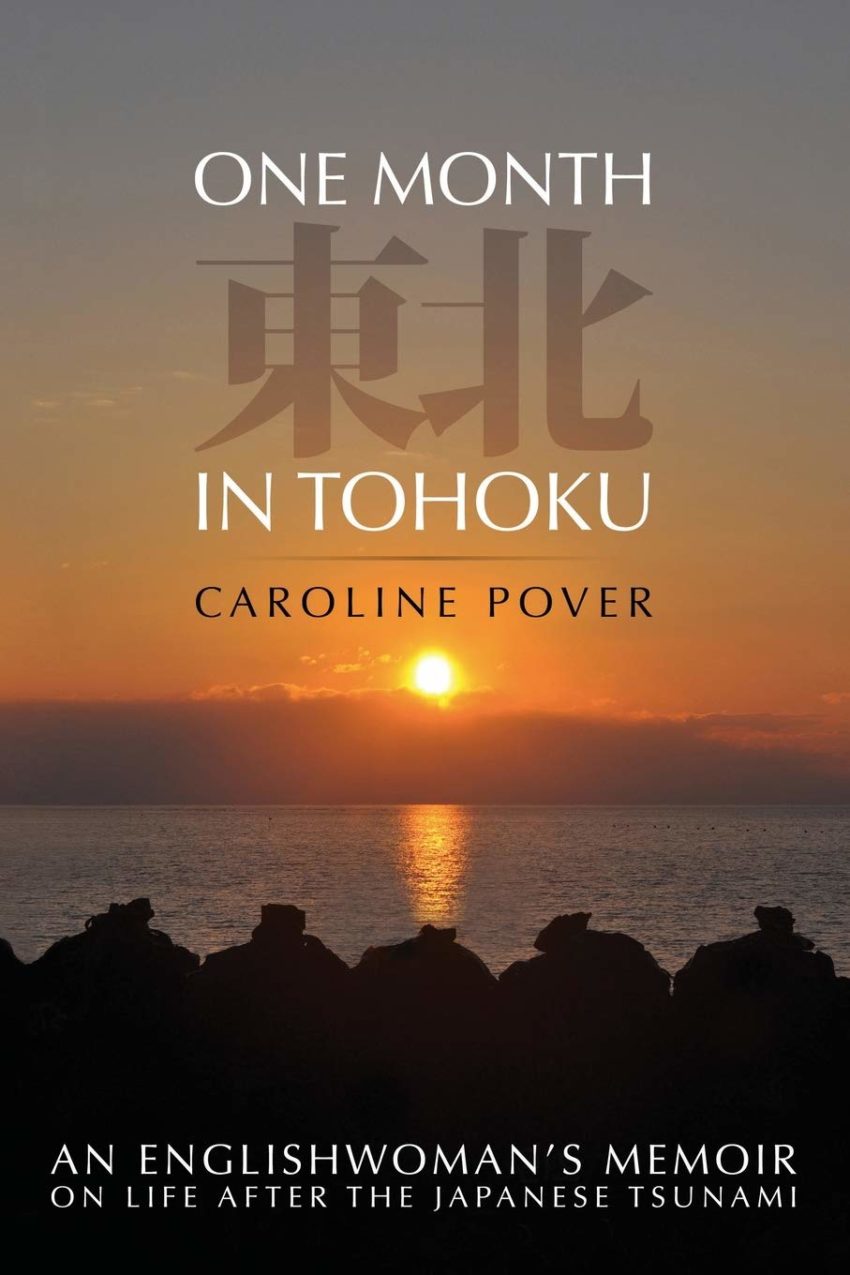Books: One Month in Tohoku
February 21, 2021 · 0 comments
By Jonathan Clements.

Caroline Pover did not spend one month in Tohoku. Well, she did, but then she went back again, and again and again. Over the last decade, pandemic lockdowns excepted, she has returned to her “adopted” village of Oshika for a month or so most years, at first as a delivery woman for emergency supplies in the wake of the earthquake and tsunami, and thereafter as a reluctant but much-loved local heroine, raising over £170,000 to help rebuild the shattered community. And with little chance of going there in 2020, she spent a different kind of month, 29 days to be precise, writing up her reminiscences.

Pover stands on a hilltop in Saipan in 2011, waiting for the threat of a secondary tsunami to pass, and resolves to go back to the UK to raise funds to help the country she loves. And she has already dropped a few hints in her text that she is in a position privileged enough to get things done. She begins her story as a publisher, author and owner of Tokyo Weekender, on first-name terms with bosses and bigwigs. She hasn’t even arrived back in England before she has secured a deal from Virgin Atlantic to ship any supplies she can acquire back to Japan for free. Hitachi Capital let her have a free van. She plainly has a charisma and chutzpah that she likes to hide up her sleeve – how many other self-published books can boast of a foreword from Britain’s former ambassador to Japan?
One Month in Tohoku: An Englishwoman’s Memoir of Life After the Japanese Tsunami is, understandably, a very personal narrative. It sometimes reads less like a book and more like your weird auntie’s Christmas round-robin, tumbling over itself to tell you about All The Things, and often skating over people, events or backstory. I would have liked, for example, to have read more about the backlash towards the flyjin – a topic alluded to, for example, in Anna Sherman’s The Bells of Tokyo – as people like Pover were pilloried for not immediately returning to Japan to endure the unendurable, as if this somehow meant they cared less. I would have also liked more gossip regarding the culture shock she feels at her return to her native Britain – where friendships play second fiddle to reality TV, and where people sneer at her fund-raising efforts that “Japan doesn’t need any more socks.”
But Pover is in a rush to get back to Japan, because it’s Japan that really matters, to the book and to her, and before long we find her haring around the ruined Tohoku countryside with a van full of vital supplies, handing them out to baffled locals and saying that they are gifts from the people of Britain. She frets about the ethics of photography, keen to chronicle the charity as it hits home, so that people can literally see the fate of the toothbrush they donated to a person they would never meet; but she is unable to bring herself to take a picture of someone else’s misery. Pover was by no means the only Samaritan who gave up their own time (and sometimes careers) to help in Tohoku, and her book nods towards many other figures, whose own stories will hopefully be chronicled someday.

Pover’s narrative of her Tohoku experiences scales out and out like a Christopher Nolan film, beginning with her first frenzied days handing out supplies to tsunami victims, and then the years that followed as she returned to follow up: a day, a month, a decade. The reader experiences her expanding circle of attention almost in real time – when she first sees Oshika, it is a once-picturesque village in ruins, populated by wary victims and feral children. As she gains the deeper time and perspective to look around her, we get to hear about people’s lives and the long history of the community.
One Month in Tohoku is that most glorious of prospects: a disaster-movie in reverse, beginning with the awful, grandstanding destruction, and then showing us the village rebuilding, names being put to faces, and storylines unfolding. Throughout, Pover offers a gritty insider’s view of the charity worker’s life, as she struggles with logistic issues far removed from the magazine-cover glory of being performatively helpful. How do you cope with getting your period at an emergency shelter? How many personal comforts (like changes of clothes) can you afford to bring when every square inch of your luggage is needed for supplies? How do you decide what to do with the surplus money – you’ve got to spend it on something, but what will be best for the village?
As the years pass, Pover gets to enjoy (and sometimes regret) the long-term consequences of her actions. She maintains contact not only with the people of Oshika, but with the donors back in Britain, ensuring that a mums’ collective gets to know they paid for a bus shelter, and that children at a British school understand the palpable difference their sponsored sleep-in made to the lives of distant strangers. There are compelling asides in her conclusion of other dramas still too raw to process, such as the charity workers who proved unsuitable for their task and were not invited back. She deals with misdirected supplies and dead-end projects, but the successes far outweigh the failures, and she notes with evident pride the number of Union Jack hearts that can be found dotting the buildings of a remote Japanese peninsula.
Jonathan Clements is the author of A Brief History of Japan. One Month in Tohoku: An Englishwoman’s Memoir on Life After the Japanese Tsunami by Caroline Pover, is available from Amazon.
Leave a Reply